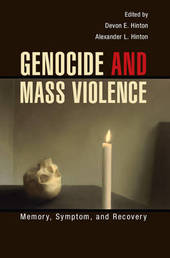
|
Genocide and Mass Violence: Memory, Symptom, and Recovery
Hardback
Main Details
| Title |
Genocide and Mass Violence: Memory, Symptom, and Recovery
|
| Authors and Contributors |
Edited by Devon E. Hinton
|
|
Edited by Alexander L. Hinton
|
| Physical Properties |
| Format:Hardback | | Pages:448 | | Dimensions(mm): Height 235,Width 158 |
|
| Category/Genre | Genocide and ethnic cleansing |
|---|
| ISBN/Barcode |
9781107069541
|
| Classifications | Dewey:363.32 |
|---|
| Audience | | Professional & Vocational | |
|---|
| Illustrations |
11 Tables, unspecified; 20 Line drawings, unspecified
|
|
Publishing Details |
| Publisher |
Cambridge University Press
|
| Imprint |
Cambridge University Press
|
| Publication Date |
17 November 2014 |
| Publication Country |
United Kingdom
|
Description
What are the legacies of genocide and mass violence for individuals and the social worlds in which they live, and what are the local processes of recovery? Genocide and Mass Violence aims to examine, from a cross-cultural perspective, the effects of mass trauma on multiple levels of a group or society and the recovery processes and sources of resilience. How do particular individuals recall the trauma? How do ongoing reconciliation processes and collective representations of the trauma impact the group? How does the trauma persist in 'symptoms'? How are the effects of trauma transmitted across generations in memories, rituals, symptoms, and interpersonal processes? What are local healing resources that aid recovery? To address these issues, this book brings into conversation psychological and medical anthropologists, psychiatrists, psychologists and historians. The theoretical implications of the chapters are examined in detail using several analytic frameworks.
Author Biography
Devon E. Hinton, MD, PhD, is an anthropologist and psychiatrist and an Associate Professor of Psychiatry at Harvard Medical School and Massachusetts General Hospital. His work has focused on culturally specific presentations of anxiety disorders, particularly trauma-related disorder, and culturally sensitive treatment of those disorders. He is the first author of more than 100 articles and chapters. He is the co-editor of four volumes, two with Byron Good: Culture and Panic Disorder and Culture and PTSD. He was a member of the DSM-5 cultural study group, as well as an advisor to the anxiety, OC, posttraumatic, and dissociative disorders work group of DSM-5 (American Psychiatric Association). He is the director of a trauma refugee clinic for Southeast Asian refugees in Lowell, MA. Alexander L. Hinton, PhD, is Director of the Center for the Study of Genocide and Human Rights, Professor of Anthropology and UNESCO Chair in Genocide Prevention at Rutgers University. He is the author of the award-winning Why Did They Kill? Cambodia in the Shadow of Genocide and nine edited or co-edited collections. In recognition of his work on genocide, the American Anthropological Association selected him as the recipient of the 2009 Robert B. Textor and Family Prize for Excellence in Anticipatory Anthropology. He is also the immediate past President of the International Association of Genocide Scholars (2011-13) and was a Member/Visitor at the Institute for Advanced Study at Princeton (2011-13). He has been invited around the globe to lecture on genocide and mass violence.
Reviews'Fascinating, compelling and challenging, Genocide and Mass Violence is terrific for reading and teaching. Trauma is one of the great topics of our age, yet we still do not understand trauma deeply, and its effects are contested and debated. This collection gives us evidence and arguments to help us form our own perspective on mass violence and its long-term consequences. One of the most interesting collections of anthropological essays I have read in years.' Tanya Marie Luhrmann, Stanford University 'This outstanding collection of articles uses cross-disciplinary and cross-cultural approaches to explore the emotional, social and political consequences of mass violence, including community efforts at reconciliation and healing. The collective effort is admirable in many ways, but especially in its grounding of complex psychosocial and political issues in the ethnography of people's everyday lives.' Douglas W. Hollan, University of California, Los Angeles 'This collection will make the reader uncomfortable and evoke powerful emotions. It compels us to not just contemplate the aftermath of unspeakable violence and blood-chilling events, but to consider the trauma that survivors must contend with as they try to live in the present and build a future. Drs Hinton and Hinton ask us to step outside our comfort zone and imagine the challenges victims of genocide face while trying to regain faith in humanity, trust in social institutions, and develop a sense of security in a troubled world.' Mark Nichter, Regents' Professor and Professor of Anthropology, Public Health and Family Medicine, University of Arizona 'Trauma has become a major figure, both psychological and moral, in the contemporary understanding of the consequences of mass violence. It is the great merit of Drs Hinton and Hinton to bring together compelling and insightful case studies from around the world, thus allowing for a pioneering global perspective on the juncture between suffering and memory.' Didier Fassin, James D. Wolfensohn Professor, Institute for Advanced Study 'Genocide and Mass Violence is an extremely successful volume that not only brings together an amazing and interesting collection of research and collaborators but forces the reader to consider how experiences of violence continue to unfold beyond the battlefield. Its cross-disciplinary approach gives the reader new insights and perspectives that would otherwise be lacking from a single-field examination and produces a truly unique work.' Anthropos
|